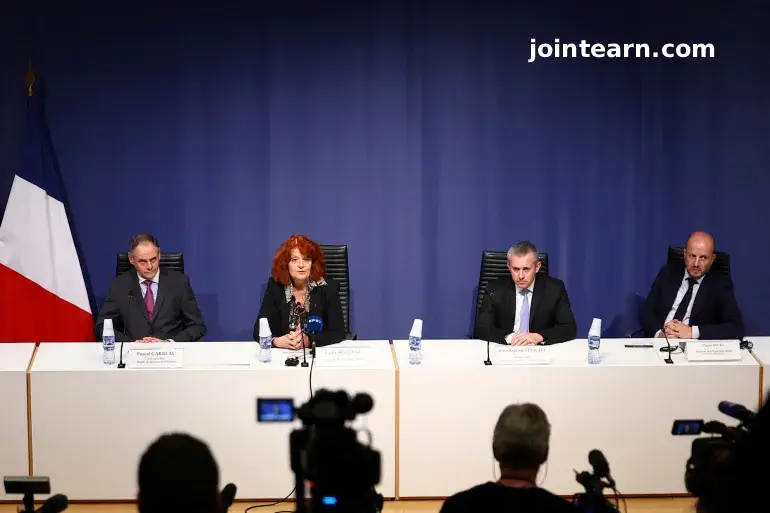
Jewels worth €88 million still missing as investigation exposes major security lapses at the Louvre Museum.
Paris, France – October 29, 2025
Two men arrested in connection with the spectacular jewel heist at France’s world-famous Louvre Museum have partially admitted their involvement, according to Paris Public Prosecutor Laure Beccuau. The suspects are now facing serious charges of theft committed by an organised gang and criminal conspiracy, Beccuau confirmed during a press conference held on Wednesday in the French capital.
Partial Admissions and Serious Charges
The prosecutor revealed that the two men have made partial confessions linking them to the daring robbery that took place on October 19, when a group of thieves managed to steal eight pieces from the French crown jewels, valued at approximately €88 million ($102 million).
Both suspects are expected to be charged with organised theft, which carries a potential 15-year prison sentence, and criminal conspiracy, punishable by up to 10 years in prison. They remain in provisional detention while the investigation continues.
Despite the arrests, Beccuau confirmed that the stolen jewels have not yet been recovered, warning that any attempt to sell or purchase them would constitute a criminal act of concealment. “These jewels are unsellable,” she said. “It’s still time to give them back.”
Inside the Eight-Minute Louvre Heist
The Louvre Museum robbery has stunned France and art lovers around the world. Authorities say the theft took less than eight minutes to execute. The perpetrators forced open a window, used power tools to cut through reinforced glass cases, and escaped with priceless royal jewels before security guards could react.
The incident has raised questions about how one of the most secure and visited museums on Earth — home to the Mona Lisa and other masterpieces — could have been breached so swiftly and efficiently.
Who Are the Suspects?
Prosecutor Beccuau identified one of the suspects as a 34-year-old Algerian national residing in France since 2010. He was apprehended on Saturday night at Charles de Gaulle Airport, moments before boarding a one-way flight to Algeria. He lived in the northern Paris suburb of Aubervilliers and had prior encounters with law enforcement for minor traffic offenses.
The second suspect, aged 39 and also living in Aubervilliers, was arrested the same night at his home. He has a record of thefts and burglaries, and forensic teams matched his DNA to evidence recovered from the scene — including one of the shattered glass cases used to display the stolen jewels.
Authorities noted there was no indication that the second suspect intended to flee France. Prosecutors had until late Wednesday to either charge, release, or request a judge’s extension for detention — they chose to proceed with formal charges.
Louvre’s Security Under Scrutiny
The Louvre heist has sparked nationwide outrage and prompted a deep investigation into France’s cultural security standards. Paris Police Chief Patrice Faure told French lawmakers that significant vulnerabilities had been identified in the museum’s ageing security infrastructure.
He revealed that parts of the Louvre’s video surveillance system remain analog, leading to low-resolution footage and slower data transmission. Even more troubling, the museum’s authorization to operate its security cameras expired in July and had not been renewed — a bureaucratic failure that Faure described as “symptomatic of broader negligence.”
Faure also explained that while police responded “extremely fast” once alerted, the initial delay occurred at the museum level, where communication gaps between the first alarm, security staff, and emergency responders allowed the thieves to escape.
According to investigators, the first alert did not come from the museum’s own systems but from a cyclist who spotted masked men using a basket lift to access a window and immediately called emergency services.
A Pattern of Cultural Heists in France
The Louvre robbery is not an isolated case. Within 24 hours, another museum in eastern France reported the theft of gold and silver coins after discovering a smashed display case. Just weeks earlier, Paris’s Natural History Museum suffered a similar break-in, where gold nuggets worth over $1.5 million were stolen. A Chinese woman has been arrested and charged in that separate case.
These back-to-back incidents have fueled a growing debate over how France protects its national treasures and the urgent need for modernization. A long-planned overhaul of the Louvre’s security network, officials admitted, will likely not be completed until 2029–2030.
Ongoing Investigation
As French authorities continue their investigation, international agencies are being alerted to prevent the jewels from being smuggled or sold on the black market. Experts say that even dismantled or recut, the gems’ unique characteristics could make them traceable.
The partial admissions by the two suspects mark a significant step forward in the case, but until the jewels are recovered, the Louvre heist remains one of the most audacious cultural thefts in modern French history.


Leave a Reply